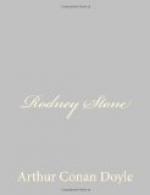“Travel!” cried the woman, with extraordinary vehemence. “Why, what the—” and she broke into such language as I had never heard from a man’s lips before. “We’d start with our swingle-bars touching, and we’d have your dinner ordered, cooked, laid, and eaten before you were there to claim it.”
“By George, yes, Letty is right!” cried the man. “D’you start to-morrow?”
“Yes, Jack.”
“Well, I’ll make you an offer. Look ye here, Charlie! I’ll spring my cattle from the Castle Square at quarter before nine. You can follow as the clock strikes. I’ve double the horses and double the weight. If you so much as see me before we cross Westminster Bridge, I’ll pay you a cool hundred. If not, it’s my money—play or pay. Is it a match?”
“Very good,” said my uncle, and, raising his hat, he led the way into the grounds. As I followed, I saw the woman take the reins, while the man looked after us, and squirted a jet of tobacco-juice from between his teeth in coachman fashion.
“That’s Sir John Lade,” said my uncle, “one of the richest men and best whips in England. There isn’t a professional on the road that can handle either his tongue or his ribbons better; but his wife, Lady Letty, is his match with the one or the other.”
“It was dreadful to hear her,” said I.
“Oh, it’s her eccentricity. We all have them; and she amuses the Prince. Now, nephew, keep close at my elbow, and have your eyes open and your mouth shut.”
Two lines of magnificent red and gold footmen who guarded the door bowed deeply as my uncle and I passed between them, he with his head in the air and a manner as if he entered into his own, whilst I tried to look assured, though my heart was beating thin and fast. Within there was a high and large hall, ornamented with Eastern decorations, which harmonized with the domes and minarets of the exterior. A number of people were moving quietly about, forming into groups and whispering to each other. One of these, a short, burly, red-faced man, full of fuss and self-importance, came hurrying up to my uncle.
“I have de goot news, Sir Charles,” said he, sinking his voice as one who speaks of weighty measures. “Es ist vollendet—dat is, I have it at last thoroughly done.”
“Well, serve it hot,” said my uncle, coldly, “and see that the sauces are a little better than when last I dined at Carlton House.”
“Ah, mine Gott, you tink I talk of de cuisine. It is de affair of de Prince dat I speak of. Dat is one little vol-au-vent dat is worth one hundred tousand pound. Ten per cent., and double to be repaid when de Royal pappa die. Alles ist fertig. Goldshmidt of de Hague have took it up, and de Dutch public has subscribe de money.”
“God help the Dutch public!” muttered my uncle, as the fat little man bustled off with his news to some new-comer. “That’s the Prince’s famous cook, nephew. He has not his equal in England for a filet saute aux champignons. He manages his master’s money affairs.”




